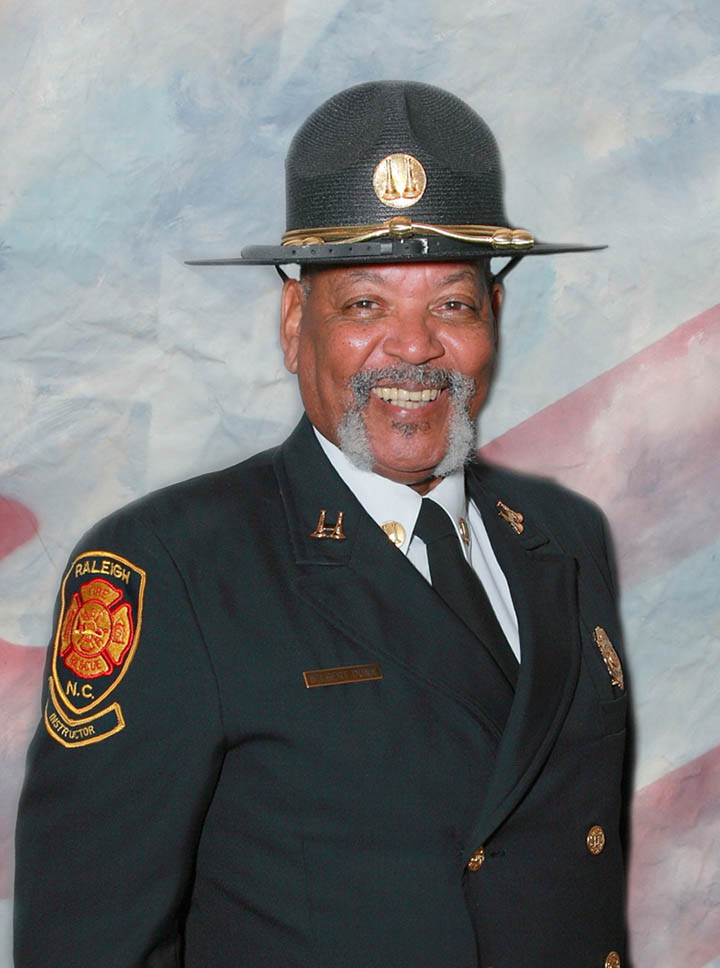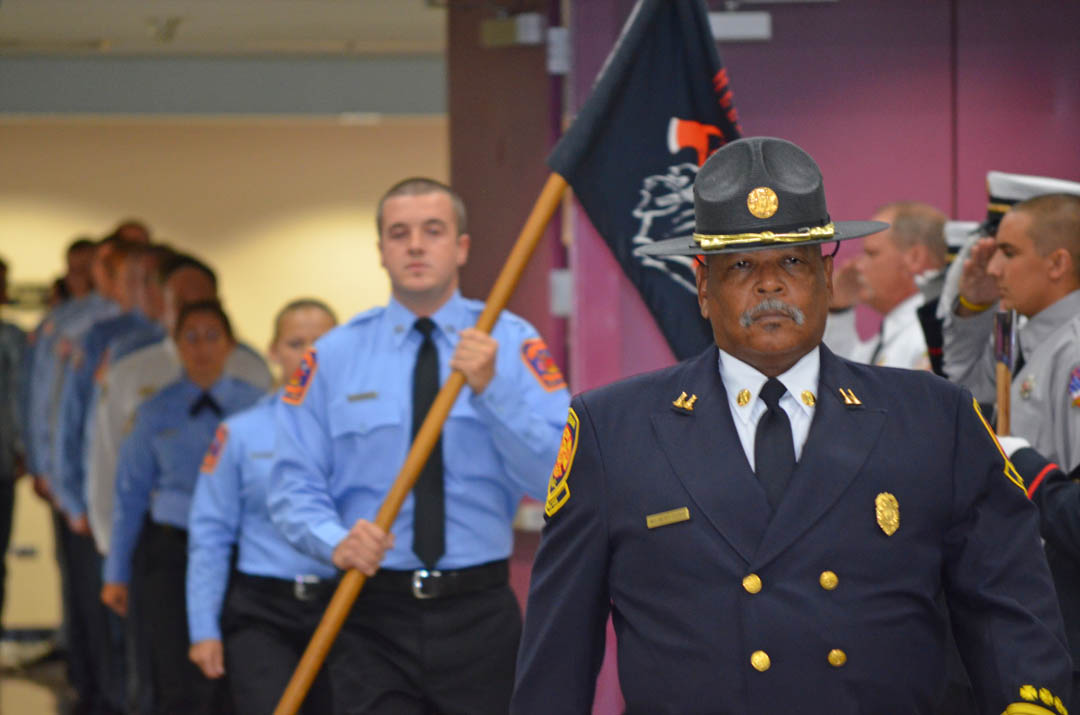
College News
Capt. Dunn, the heart of CCCC's Fire Academy
12.30.2013 • College & Community, College General, Students/Graduates
SANFORD - Fire Capt. Wilbert "Tramp" Dunn, was 22 years old and just out of service in Vietnam when he found the inspiration for his life's work.
"One day, I was stuck in traffic in Raleigh and there was a right bad accident in front of me," he said. "The firemen were the first to get there. They saved property; they no doubt saved lives. I thought, I'd like to do that, so I got with a volunteer fire department. Once I fought my first fire, the bug bit and the rest is history."
And what a history it has been. Dunn retired from the Raleigh Fire Department in 2003 after more than 31 years of service, most of it as a firefighter trainer. When Central Carolina Community College decided to establish its own Fire Academy in 2010, Dunn was the logical choice to get it off the ground.
Dunn is cutting back on firefighter training at this point, due to health issues, but he leaves a legacy of leadership in the field and CCCC's Fire Academy, which he describes as one of the best in North Carolina.
"He has done wonders with the Fire Academy," said Joey Shue, retired Sanford Fire Department captain and the college's Fire/Rescue coordinator. "People just love him. He knows how to motivate these kids to get them to do better and to get everything done. He's been a great inspiration to get them started off on the right foot."
Most of Dunn's years with the RFD were spent as a trainer at Wake County's Fire Academy, sharing what he had learned both through training and by hard and dangerous experiences at fires. He brought that expertise to the CCCC Fire Academy.
The college has been offering firefighter training since 1974. Over the years, the program grew to include other types of emergency and first responder training. In 2001, the state, county and college worked together to transform the former Sanford-Lee County Airport, off Tramway Road, into the Emergency Services Training Center. It serves as a training facility for first responders in the college's three-county service area of Chatham, Harnett, and Lee, and beyond.
Shue has served as the Fire/Rescue Training coordinator since 1995. As the training programs grew and enrollment increased, he realized that the ESTC was missing a critical component: a Fire Academy. With an academy, people could receive intensive and varied training to meet the demands of modern fire and rescue work.
"When we first started planning for this Academy, Capt. Dunn was really the only person I knew that I could bring in here and get it started off on the right foot," Shue said. "He knew the academy setting, and I knew he was the man for the job. He has been the backbone of it since it opened in 2010."
Dunn had been enjoying his retirement, but the thought of setting up an academy to train people in the critically important career field he loved was very attractive. He agreed to come and do one seven-month academy, to show how an academy is run. Then, he would turn it over to someone to run and go back into retirement. That was five academies ago.
The Fire Academy program is 815 hours of training. Cadets earn certifications in areas such as emergency medical response, fire fighting, hazardous materials, and vehicular rescue. They also train in incident command systems, rapid intervention, safety and survival, interviewing, and physical agility. Students are required to wear firefighter uniforms during training.
"I can see the result of making Lee, Chatham and Harnett counties a better place to live, to work and play, thanks to Central Carolina and this Academy," Dunn said. "We're preparing students to go into a very exciting, life-saving career. Oh, how exciting it is [for a firefighter] to get the call that someone's losing everything and you make a difference! Oh, how exciting it is for this rubble to be piled up on the highway and you get these people out of the vehicles and save a life - nobody goes to the morgue today.
"Oh, how exciting it is to bring life on the face of this Earth, delivering a child!" he continued, "And you know that before the academy started that you didn't have that knowledge, you didn't have those skills. Oh, how it makes me feel that I can rest at night knowing that some of these people are out there doing the will of the Master, the college, and the emergency services."
Dunn gives a large part of the credit for the success of the Academy to the area fire departments, who lend their expensive fire fighting equipment and trucks for training. The downside is that the equipment is not always available. When the tornado struck Lee County in 2010, training on equipment had to be put on hold temporarily because the fire departments had a critical need for it. Dunn looks forward to the day when the college will have the budget to purchase more of its own equipment.
Dunn brought his years of expertise and experience to the creation of the Academy. He also brought something he had learned as a young man in the U.S. Army: discipline is Rule #1.
That discipline shows in doing things right, whether it's cleaning up a spilled cup of coffee in the classroom or practicing rescue maneuvers. It shows in the respect for and courtesy toward others that Dunn demands of the cadets. And, it shows in the self-confidence that the cadets gain, knowing that they have learned to meet the challenges of their hard and dangerous job with skill, compassion, and teamwork.
"Having been a military policeman has affected how I train," Dunn said. "I introduced paramilitary training and discipline when I was a trainer in Raleigh and have been doing that ever since. I teach the recruits, you've got one shot to make a difference, one shot is all God gives you when you go out of here. If any firefighters that graduate this Academy could not put it out, there's no need to call another fire department because they can do no better. If my Academy couldn't put it out, call out the military - that's the only other resource you got. Is that cocky? No. That's knowing your job. You're going to do your job around here or you will not graduate this Academy."
Dunn is strict, but his heart is very much with the cadets. There are few scholarships for those attending the Fire Academy. In a recent class, three of the students sold their pickup trucks to pay their tuition. Sometimes, there are students who say they don't need lunch, when the reality is that they used their lunch money for gas to get to class. Dunn frequently reaches into his own pocket to help them.
"I see a bunch of me in them," he said quietly.
Firefighter Jonathon Baker is one of the many who trained for their career under Dunn. He is currently a full-time firefighter for North Chatham Fire Department and a volunteer for the Pittsboro Fire Department.
Baker graduated from the Academy in 2011, earned his Associate of Science in Fire Protection Technology from Guilford Technical Community College in 2013, and is currently pursuing a bachelor's degree in Fire Safety Engineering Technology from UNC-Charlotte.
"Captain Dunn's passion for fire service ignited my passion for that career," Baker said. "He is the sum of all a firefighter should and can be. He always looks out for his own, and puts others first. Clearly, he's one of the best fire officers to have ever served in the state. He's affected the lives of hundreds, if not thousands, of firefighters. He has impacted the future of North Carolina's fire service by living and teaching a single sentence: 'The future belongs to those who prepare for it.'"
At a recent graduation, a grandmother thanked Dunn for taking her grandson under his wing. With tears in her eyes, she said, "My grandson is 19 years old and he's never said 'Yes, ma'm' to me in his life, but he's been doing that since he came to this school. I asked him, was he going to cut grass, and he said, 'Yes, ma'm, grandmom,' and I thought my grandchild was sick. He went out, got the lawnmower out, checked the oil - I've never seen him check the oil. He put the gas in and he cut the entire yard. My grandson has never done that in 19 years. You have made a man out of him. I'm so happy, I could die a happy woman now."
Dunn smiled at the memory and said, "You can't give me a million dollars for that. That makes me sleep very comfortable at night knowing that we - not me - the entire staff at Central Carolina made a difference in somebody's life."
For more information on CCCC's Firefighter Academy, contact Shue, at (919) 777-7778, go online to www.cccc.edu/ecd/departments/emergencyservices/fire.php or visit the Academy at 3000 Airport Road, in Sanford.

Capt. Wilbert 'Tramp' Dunn, developer and head of Central Carolina Community College's Fire Academy, leads cadets into their graduation ceremony at the Dennis A. Wicker Civic Center. Dunn was a firefighter trainer for most of his 31 years with the Raleigh Fire Department before his retirement in 2003. He later developed and has run the college's Academy, which opened in 2010. Firefighter cadets receive seven months of intensive training and then go out to serve in fire departments in Chatham, Harnett, Lee, and surrounding counties. For more information on CCCC's Firefighter Academy, contact Joey Shue, at (919) 777-7778, go online to www.cccc.edu/ecd/departments/emergencyservices/fire.php or visit the Academy at 3000 Airport Road, in Sanford.

Capt. Wilbert 'Tramp' Dunn, developer and head of Central Carolina Community College's Fire Academy, has been training and inspiring firefighters at the Academy since it opened in 2010. Before that, he had trained thousands of firefighters during his 31 years with the Raleigh Fire Department. For more information on CCCC's Firefighter Academy, contact Joey Shue, Fire/Rescue coordinator, at (919) 777-7778, go online to www.cccc.edu/ecd/departments/emergencyservices/fire.php or visit the Academy at 3000 Airport Road, in Sanford.
- Central Carolina Community College
- Serving Chatham, Harnett, & Lee Counties, NC
- 1-800-682-8353


